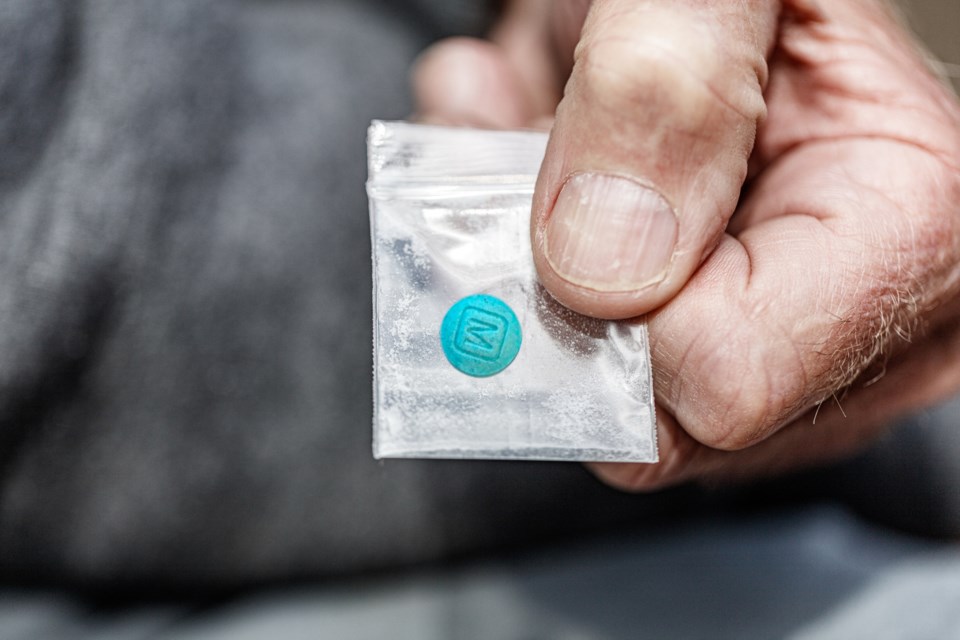A Victoria resident who was caught by police delivering fentanyl has been sentenced to a federal prison for two years plus one day by B.C. Supreme Court Justice Robin Baird, who chastised the man’s role in the “disaster” that has unfolded on the province’s streets.
Dana Stanly Gordon Carlson, 50, was found guilty of a single count of possession of fentanyl for the purpose of trafficking on Nov. 16, 2023.
Carlson had been caught delivering seven ounces of 14 per cent pure fentanyl worth $24,000 to the Victoria Police Emergency Response Team on Jan. 6, 2021.
While Baird said Carlson’s role in the fentanyl supply chain was “limited to that of a courier or delivery driver” and noted Carlson had no prior criminal convictions and was remorseful, the judge declined a conditional sentence (CSO) sought by Carlson’s attorney.
“A CSO would not be a fit sentence, based on the ever-widening body of appellate authority enjoining trial judges to impose penitentiary sentences in cases involving the mid-level trade in this pernicious substance, even for first timers, even for bit players, given the blight that this trade inflicts on pretty well every community in Canada,” Baird told Carlson in sentencing.
Carlson had told the court of a tough childhood, obtaining only a Grade 8 education, and how his drywalling business dried up during the COVID-19 pandemic leading him to make, as Baird described, “a disastrous choice while he was in this straightened financial situation.”
Carlson, who ended up living most recently in a social housing complex, told the court that he was paid $500 to deliver the fentanyl on behalf of a “contact” from Nanaimo.
“But none of that alters the fact that in a case like this, the preeminent principles of sentencing are those of denunciation and deterrence,” Baird stated.
“The devastating effects of fentanyl distribution and use are by now notorious. We all know what is going on, Mr. Carlson, and you do, too. Drug addicts are dropping dead all over the place from the abuse of this substance, and living at Our Place in Victoria you must see it with your own eyes every single day.
“The numbers are staggering,” the judge went on.
“Illicit trade in fentanyl not only destroys lives but entire communities. Consider its profoundly negative effects on the public. It severely compromises the peace, the health, the sense of well‑being that should be every British Columbian's right to expect in every community in this province, and what we have instead are legions of ill and impoverished addicts in every downtown core, every town and municipality in our province. It is a disaster.”
Baird did nevertheless provide some leniency to Carlson as the Crown prosecutors sought a four-year prison sentence. Baird also did not force Carlson to submit a DNA test to government (which was discretionary in this case).
“I do so, as I have said, on the basis of your age and history,” said Baird, adding “Serve your time, and when you are released, I expect you to return to your law-abiding ways and take care of your family.”
Last year, the court heard how the Victoria officers executed a warrant to search a hotel room occupied by someone called Tighson Laughren at the Chateau Victoria Hotel located at 740 Burdett Ave.
They seized Laughren’s unlocked phone, which they then used to contact Carlson who went by the codename “Bradpitt” on the encrypted messaging app Signal.
Upon calling in the drug order, Carlson delivered and was arrested.
The fentanyl Carlson delivered is typically trafficked at street level at a lesser purity than 14 per cent, meaning that the product could be cut or diluted producing more trafficable doses and profit, Baird noted.
Carlson initially contested his warrantless arrest and statements made to police as infringing on his Charter rights. Baird ruled otherwise.



